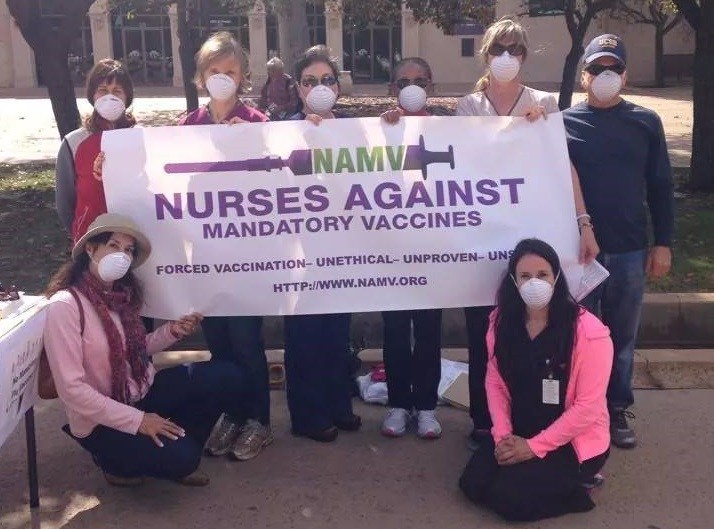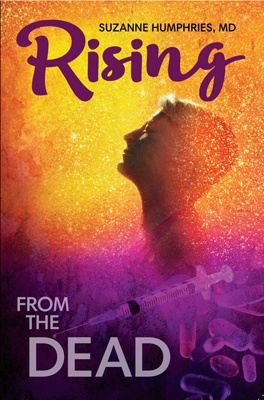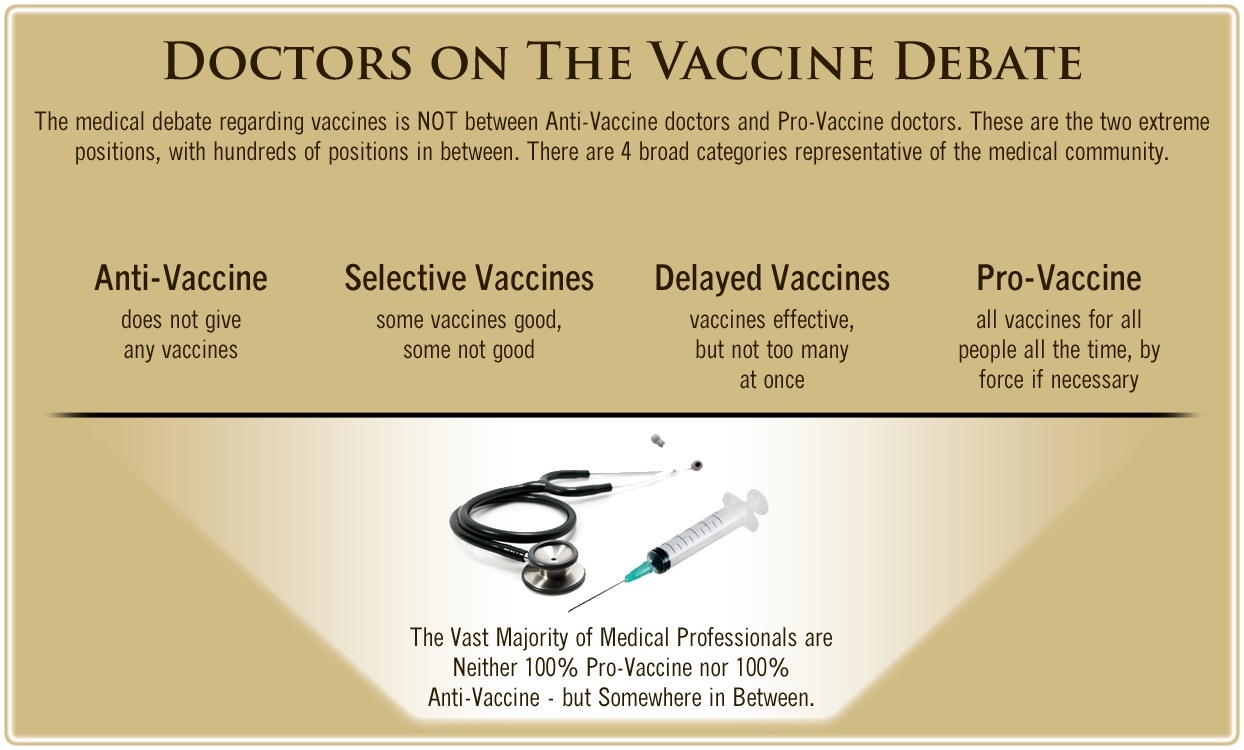
Many hospitals allow nurses to stay employed while choosing to refuse the mandatory flu vaccine if they wear a mask at work during the entire flu season. Photo from Nurses Against Mandatory Vaccines Facebook Page.
by Brian Shilhavy
Editor, Health Impact News
The U.S. Department of Justice (DOJ) has filed a civil rights lawsuit against Ozaukee County, an affluent suburb just north of Milwaukee, for forcing a nursing assistant at their county-owned and operated nursing home and rehabilitation facility to receive a mandatory flu shot as a condition for her continued employment.
Barnell Williams was a nursing assistant at Lasata Care Center, which has a policy of mandating flu shots for all of its employees.
However, Lasata permitted employees to obtain a religious exemption from the vaccination requirement, allowing them to wear protective masks during the flu season instead of receiving the shot.
According to the lawsuit, Williams applied for the religious exemption, but was denied because she was not part of a religious organization that had a “clergy” attest to her belief.
On October 24, 2016, Williams met with Campus Administrator Ralph Luedtke, the Center’s highest-ranking official, and requested a religious exemption from its mandatory vaccination. In their meeting, Williams explained that she had a religious belief stemming from her interpretation of the Bible that prohibited her from putting certain foreign substances, including vaccinations, in her body because it was a “Holy Temple.” Williams told Luedtke that she believed that receiving a vaccination would violate that religious prohibition.
At the October 24 meeting, Luedtke told Williams that she needed to submit a letter from her clergy member to obtain the exemption, pursuant to the Center’s policy. Williams responded that she could not provide such a letter because she had no affiliation with any church or organized religion and therefore had no clergy leader to write the letter.
Despite Williams’ explanation of her religious objection, Luedtke denied Williams’ request for a religious exemption from vaccination because Williams did not provide a letter from a clergy member. Luedtke told Williams that if she did not receive a vaccination she would be terminated. Specifically, Luedtke told Williams that if she did not get the shot, “Consider this your last day.”

Lasata Care Center Administrator Ralph Luedtke
Williams allegedly brought a “To Whom it May Concern” letter explaining her religious objection, as well as testimonials from others about the sincerity of her religious belief, but Luedtke allegedly denied her the opportunity to even present these documents. From the lawsuit:
At their meeting, Luedtke did not allow Williams to provide any alternative to the letter from the clergy member as verification of the sincerity of her religious objection to being vaccinated.
To verify the sincerity of her religious objection to vaccination, Williams was prepared to provide Luedtke with a “To Whom it May Concern” letter that she had previously written that explained the Bible-grounded basis for her religious objection and cited specific Biblical passages in support.
Williams was also prepared to have close family members and friends personally attest to the sincerity of her religious faith and practices. Williams was unable to use the letter or the information from her friends and family because Luedtke would only accept a letter from a clergy member as verification of her faith.
Faced with the decision of losing her employment or receiving a flu shot against her conscience and belief, Williams relented and submitted to the flu shot, allegedly resulting in severe emotional trauma. According to the lawsuit:
Threatened with immediate termination by Luedtke if she did not take the flu shot, Williams relented and agreed to receive the shot, which was administered to her by the Center staff immediately after her meeting with Luedtke.
Right after the Center’s Infection Preventionist, Deborah Steele, gave her the flu shot, Williams became emotionally distraught and cried uncontrollably up until the time she left the room.
Williams suffered severe emotional distress from receiving the flu shot in violation of her religious beliefs, including withdrawing from work and her personal life, suffering from sleep problems, anxiety, and fear of “going to Hell” because she had disobeyed the Bible by receiving the shot. These deep emotional problems stemming from having to take the flu shot have plagued Williams to the present.
[S]ince Williams filed her charge, the Center changed its policy and no longer requires a letter from a clergy leader to obtain a religious exemption to the flu vaccination requirement.
Will Ozaukee County Prevail in Filing to Dismiss the Lawsuit?
According to local news WISN, Ozaukee County will file to dismiss the lawsuit:
Ozaukee County issued this response: “The county will file a motion to dismiss the Justice Department lawsuit and believe that current case law will support our motion.”
I am not sure what case law they are referring to, but the issue of denying nurses and other health-care workers religious exemptions for mandated flu shots as a condition for employment has been an issue making its way through the courts for the past few years, and Ozaukee County may find that existing case law is actually not on their side.
The U.S. Equal Employment Opportunity Commission (EEOC) has made several statements about health-care facilities mandating flu shots, citing Title VII of the Civil Rights Act, as this DOJ lawsuit against Ozaukee County likewise references.
The EEOC makes it clear that although mandatory flu vaccine policies are not per se unlawful, the key to legal compliance is accommodation. As stated by the Philadelphia District regional attorney for the EEOC:
While Title VII does not prohibit health care employers from adopting seasonal flu vaccination requirements for their workers, those requirements, like any other employment rules, are subject to the employer’s Title VII duty to provide reasonable accommodation for religion …
In that context, reasonable accommodation means granting religious exemptions to employees with sincerely held religious beliefs against vaccination when such exemptions do not create an undue hardship on the employer’s operations. [1]
The EEOC currently has several lawsuits filed challenging mandatory flu vaccinations and religious discrimination. According to Law 360:
The EEOC has also taken up the issue and has several lawsuits challenging mandatory flu vaccination policies at various health care institutions.
In 2016, for example, it alleged religious discrimination and filed EEOC v. Saint Vincent Health Care Center in Pennsylvania federal court on behalf of six health care workers who were discharged after they refused to get the flu shot despite their employer’s policy mandating the vaccination.
Although the hospital’s policy did allow for medical- and religious-based exemptions to those who objected to getting the vaccine, the EEOC alleged that the hospital had failed to accommodate the sincerely held religious beliefs of the six workers by not granting them exemptions and instead terminating their employment for noncompliance.
The lawsuit was ultimately settled by the parties, resulting in $300,000 in back pay and compensatory damages and offers of reinstatement being awarded to the individuals.
In January 2018, the EEOC similarly settled another religious discrimination case, EEOC v. Mission Hospital Inc., that it had filed in North Carolina federal court against a hospital that fired three employees for not getting the required flu shot.
In that case, the EEOC had alleged that the hospital’s policy, which required employees be vaccinated annually by a date certain unless a religious exemption request was filed by Sept. 1, was discriminatory as applied to three employees who had requested religious-based exemptions after the Sept. 1 deadline and were ultimately fired for not getting the flu vaccine as required. [EEOC v. Mission Hospital Inc., Index No. 16-cv-00118 (W.D.N.C. filed April 28, 2016)]
In addition to the EEOC obtaining $89,000 for the employees in the settlement, the court entered a consent judgment that required the hospital to change its vaccination policy among other things. [2]
The Lasata Care Center of Ozaukee County’s requirement at the time that only a clergy member could sign a statement of religious belief exempting an employee from the flu shot is also not on solid legal footing according to existing case law. According to Law360:
Although some may view religious exemptions as being reserved for traditionally religious belief systems, courts have recognized a more expansive view of what constitutes a “religion” for purposes of Title VII.
For example, things such as “Onionhead” and Alcoholics Anonymous have been recognized as religions under Title VII and other laws, and as such could serve as bases upon which an employee could claim a religious exemption to a mandatory flu shot policy.
[Warner v. Orange Cnty. Dep’t of Prob., 115 F.3d 1068, 1075 (2d Cir. 1996) (recognizing an Alcoholics Anonymous program as a religion under Title VII); EEOC v. United Health Programs, 213 F. Supp. 3d 377 (E.D.N.Y. 2016) (recognizing “Onionhead” as a religion under Title VII); Toronka v. Cont’l Airlines, Inc., 649 F. Supp. 2d 608, 612 (S.D. Tex. 2009) (finding plaintiff’s “belief in the power of dreams” that the plaintiff regarded as “a moral and ethical belief” stemming from the “traditional religious convictions of his African origin” to be a religion for purposes of Title VII); cf. Malnak v. Yogi, 592 F.2d 197 (3d Cir. 1979) (recognizing the Science of Creative Intelligence Transcendental Meditation as a religion under the First Amendment)]
And if Ozaukee County believes that they have science on their side in mandating flu shots for their employees to protect their residents from the flu, even here they are not on solid ground.
As we have repeatedly reported here at Health Impact News, the CDC themselves acknowledge that the annual flu shot is only partially successful in predicting which viruses need to be protected against each season, and published studies show that vaccinated healthcare workers provide no protection for patients anyway.
See:
CDC Study: Mandatory Flu Vaccinations of Health Care Workers Offer NO Protection to Patients
Contentious flu vaccine policies at hospitals are based on flawed research, study says
References
1. Saint Vincent Health Center to Pay $300,000 to Settle EEOC Religious Accommodation Lawsuit, U.S. Equal Employment Opportunity Comm’n, Press Release (Dec. 23, 2016), available at https://www1.eeoc.gov//eeoc/newsroom/release/12-23-16.cfm?renderforprint=1
2. Expert Analysis: Litigation Over The Flu Shot: A New Symptom Of Flu Season, Howard Miller and Jessica Moller, February 22, 2018, Law360
3. Ibid
Leaving a lucrative career as a nephrologist (kidney doctor), Dr. Suzanne Humphries is now free to actually help cure people.
In this autobiography she explains why good doctors are constrained within the current corrupt medical system from practicing real, ethical medicine.
One of the sane voices when it comes to examining the science behind modern-day vaccines, no pro-vaccine extremist doctors have ever dared to debate her in public.
Medical Doctors Opposed to Forced Vaccinations – Should Their Views be Silenced?
One of the biggest myths being propagated in the compliant mainstream media today is that doctors are either pro-vaccine or anti-vaccine, and that the anti-vaccine doctors are all “quacks.”
However, nothing could be further from the truth in the vaccine debate. Doctors are not unified at all on their positions regarding “the science” of vaccines, nor are they unified in the position of removing informed consent to a medical procedure like vaccines.
The two most extreme positions are those doctors who are 100% against vaccines and do not administer them at all, and those doctors that believe that ALL vaccines are safe and effective for ALL people, ALL the time, by force if necessary.
Very few doctors fall into either of these two extremist positions, and yet it is the extreme pro-vaccine position that is presented by the U.S. Government and mainstream media as being the dominant position of the medical field.
In between these two extreme views, however, is where the vast majority of doctors practicing today would probably categorize their position. Many doctors who consider themselves “pro-vaccine,” for example, do not believe that every single vaccine is appropriate for every single individual.
Many doctors recommend a “delayed” vaccine schedule for some patients, and not always the recommended one-size-fits-all CDC childhood schedule. Other doctors choose to recommend vaccines based on the actual science and merit of each vaccine, recommending some, while determining that others are not worth the risk for children, such as the suspect seasonal flu shot.
These doctors who do not hold extreme positions would be opposed to government-mandated vaccinations and the removal of all parental exemptions.
In this article, I am going to summarize the many doctors today who do not take the most extremist pro-vaccine position, which is probably not held by very many doctors at all, in spite of what the pharmaceutical industry, the federal government, and the mainstream media would like the public to believe.







One Comment